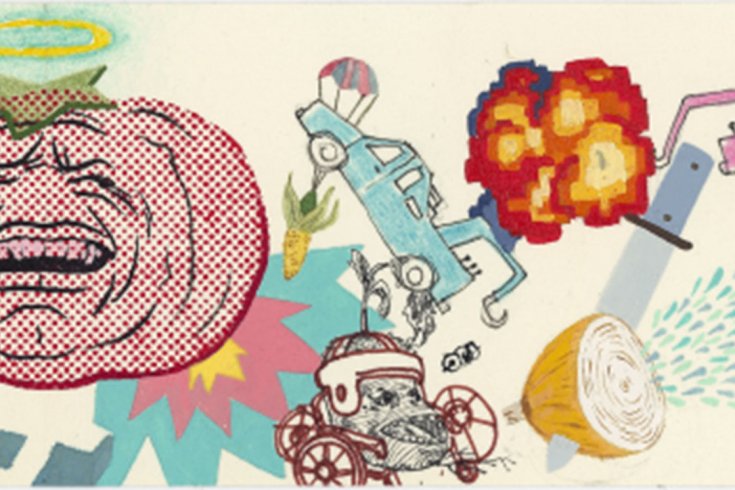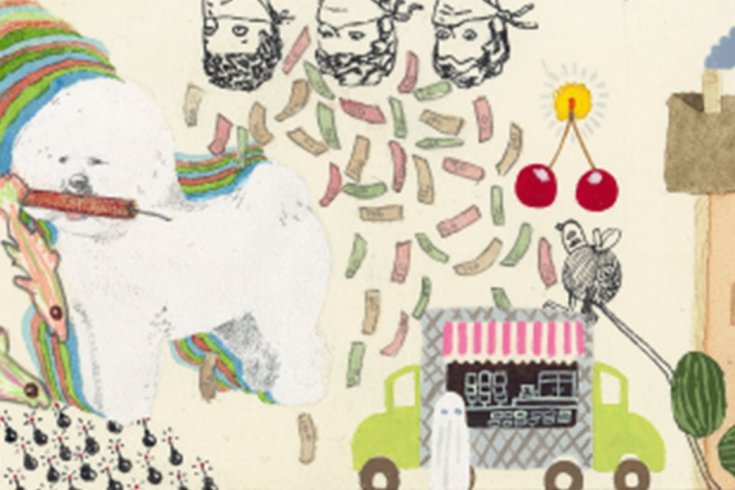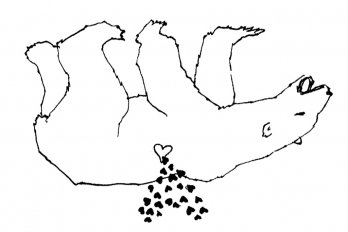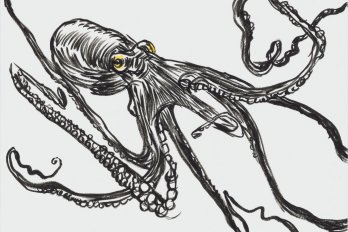My Canada includes Quebec, the earnest federalist slogan goes. Okay. Sure thing. But only as long as my Montreal still gets to include the bald barber, the drunk accountant, the tranny taxi driver, and the Hasidic guy slipping into the strip bar mid-afternoon. These are the characters who give the city character, who help differentiate it from the Mr. Muffler sprawl that has washed over so much of the continent and that laps at the island’s very shores”“the people who make Montreal something of a Naples-on-the-St.-Lawrence, albeit one with a grid system, and who give people like me at least the illusion that it isn’t always about money and efficiency everywhere in North America.
And even if it’s hard to get away with celebrating mobsters, violence, and illegality unless you’re a rapper or a major Hollywood studio, it has to be said that Montreal’s crime has always given the city flavour, pizzazz, zip, that old je ne sais quoi. Not the dark, sick crime that feels as if it just slithered out of a James Ellroy novel, like the veteran cop in the news recently who lived in a tidy suburban house with his fellow-cop wife and who has been charged with sexually assaulting teenage girls in his off-hours. But the wackier stuff, the stuff that usually stems from greed and most often contains a good dose of unadulterated stupidity.
Commercial conflicts have been behind some of the best. Maybe it’s the absence of fluoride in the water or the fact that everyone can lay claim to being part of a persecuted minority, but what might lead to scowls and dirty looks elsewhere”“perhaps harsh words and a slashed tire if things got really ugly”“ends with bombs and Molotov cocktails in Montreal. The biker war was, of course, a classic of the genre. And one that went on and on, even though the efficacy of explosives was decidedly questionable as a tool of expansion and conquest in the bikers’ hands. If the detonating device actually worked and the dynamite wasn’t damp then, as often as not, the bomb-makers blew themselves up rather than their quarry. Still, that didn’t deter the boys from their toys that go boom.
Any number of other commercial disputes between less typically nasty types than the Hell’s Angels et al. have also ended in a bang, or more often a series of bangs. Way back when, the kosher butchers, vying for the rabbi’s seal of approval, shot and bombed each other with abandon. In the early 1990s, the city’s tow-truck drivers went at it for a few years for some obscure reason. A good handful of trucks, and a few drivers, got blown up. Not long after, it was the turn of a couple of those snack-truck guys who drive from construction site to construction site. In the same decade, there was a brief flurry of pet-store bombings”“someone, apparently, was selling bichon frises too cheap or looking to corner the guppy market.
After that, things seemed to get quiet. The economy picked up. Real estate went through the roof. That venerable Québécois institution, the crime tabloid, continued its decline, with Allô Police, the best of a bad bunch, finally getting whacked in 2004 after the indignity of an aborted makeover as Allô!, a celebrity rag. Montreal began looking a little more like everywhere else.
Then, last November, a glimmer of the old Montreal: my greengrocer was firebombed. It was a sorry sight on a crisp Tuesday morning: charred boxes of soy milk, blackened fruit and veg, shards of plate glass, racks of condiments and cans toppled. And Bala, the sweet, shy, always-smiling Sri Lankan owner”“who had bought the store just a few months earlier and who, from the first visit, wouldn’t let my children off the premises without a cookie or a handful of Smarties”“was looking as pale as a Tamil guy can get.
Several hours earlier, at 12:59 a.m. to be precise, two men had smashed the store’s glass door and tossed in Molotov cocktails one after the other. They made their getaways on bicycles. It being late Monday night, there wasn’t much action on the street but a taxi driver saw it all and called 911. Firemen put out the blaze before it threatened the two elderly couples living in the upstairs apartments. But the store, which Bala and his brother, Babu, had spent much of the preceding half year improving in small ways, was a writeoff.
“Insurance job” was the first cynical thought of many in the neighbourhood. It was a reflex born of the moribund 1980s and early 1990s, when commercial real estate stayed vacant for years, when it was hard even to give a building away, and when failing businesses seemed to get torched nightly. But it didn’t make sense this time. There was all the work the brothers had been doing. There were the lineups of loyal customers at the cash. There was the absence of “service interruption” or loss-of-revenue coverage in Bala’s insurance policy. Finally, there was Bala’s paleness and obvious shock.
The next theory to occur to many of us seemed just as far-fetched: Bob, the competition. Here, a bit of backstory is required.
Before Bob, before Bala and Babu, there was Harji’s and, a couple of storefronts north, Gary Nazar’s. The shops were, for the most part, interchangeable and, unless you were a regular customer, virtually indistinguishable. The best thing on offer at each was the conversation. Both were run by affable men who seemed to regard their stores as places of social interaction rather than commercial exchange. The quick, no-nonsense purchase of a pound of coffee or a bunch of bananas was out of the question: time had to be spent chatting.
The descendant of Armenian refugees, Gary had taken over his store from his father and it wasn’t a particularly good fit. In his soul, he was a patron of the arts and would lend money, give free groceries, and run long tabs for deserving (or not) poets, musicians, and painters. The New York Times would usually be spread across his counter, and he was more interested in reading it and discussing its contents than passing a broom, stocking shelves, or cleaning up the generalized chaos of his store. Health-code citations were frequent and undisputed, the fruit and vegetables usually withered and best avoided. But that was easy to overlook; Gary was such a good member of the community that friends reported running into him in smoky kitchens at 4 a.m. on the other end of a hash joint.
Harji was less, uh, bohemian, and his store somewhat more orderly and certainly more serene. cbc Radio 2 provided a soothing soundtrack, and talk of unpleasant subjects was rare. Customers were greeted with a double-barrelled blast of Happy Happy as soon as they entered: a huge, rosy-cheeked smile and a “Hi! Hi! Hi! How arrrrrre you” When asked the same question, Harji would reply “Good to extreeemely good” or “Could not be better” and the conversation would be off on its sunny way. Wilderness trips were a favourite subject. An Ismaili Muslim who had been chased out of East Africa along with so many others in the 1970s, Harji had become the most enthusiastic Canadian, right down to the canoeing and kayaking.
Relations between Harji and Gary couldn’t have been more civil. Mornings, they’d often confer on what constituted a fair price for asparagus or the Lobo apples that had just come in. Work done for the day, they’d sometimes have a coffee together. Come summer, they’d establish a schedule where they’d stay open on alternate Sundays. For a decade or so, it was Pleasantville, with pretty reasonable prices, even if the lettuce was limp and the mushrooms were going grey-brown.
When Gary died of cancer in the mid-1990s, his sister took over the store for a couple of years but she didn’t have it in her. For a while the store sat empty, not a rare sight in those days. Then, in time for the new millennium, Bob came along, bringing his own paradigm shift. He made his store bright, clean, and colourful. The produce was fresh and diverse. The packaged goods were exotic and, more often than not, delicious. Most radically, he colonized half of the wide sidewalk in front of his store, installing an expansive awning and display bins overflowing with mangoes, peppers, berries, clementines, and cucumbers. And the prices, always reasonable in the neighbourhood, became crazy cheap. Ninety-nine-cent pineapples, sixty-nine-cent lettuces, and three avocados for a dollar became regular fixtures on Parc Ave. We’d labour home under the weight of four bags of fruit and vegetables, all bought for less than $10.
Many of us were also burdened with guilt. We’d pledged to stand by Harji in the face of this overwhelming competition. But Bob’s proved too tempting and our loyalties were quickly compromised. More and more of our food dollars found their way into his till, and our visits to Harji’s”“often just to buy flax or sunflower seeds from his bulk bins or brinjal pickle and coriander chutney from his condiment racks”“grew less frequent.
Harji made an effort to keep up with Bob. He too appropriated some of the sidewalk for display bins. His produce improved. But it was a lost cause. Bob eventually had a fleet of male relatives “”brothers, sons, nephews”“all of whom seemed prepared to work eighty- or ninety-hour weeks. Harji just had himself, his wife, and maybe an occasional shelf-stocker. And he had a life to lead outside his store.
On the surface, relations between Harji and Bob seemed perfectly civil. Shortly after setting up shop, Bob had told people he wasn’t interested in running Harji out of business or off the block; there was room for everyone. “We’re both Pakistanis”“why would I want to hurt him” Bob said. But things weren’t anywhere near as smooth as they had been in the old days. Early on, Harji had approached Bob to inquire whether he might be interested in the kind of gentlemanly arrangement he’d had with Gary Nazar. Or to, at least, establish an agreement to keep the competition from becoming cutthroat and relentless. Bob blew him off.
And prospered. Within four years, Bob had taken out a lease on an empty storefront on the other side of the mega-drugstore immediately to his north. There, he set up his brother with a store specializing in organic produce and health foods, competing with the granola side of Harji’s business. Still, between the bourgeois branchés of Outremont on the west side of Parc Ave. and the neo-hippies of Mile End to the east, the organic thing seemed a good call. Then, in early 2005, Bob rented a shop directly across the street and opened a charcuterie full of olives, fresh pasta, fancy crackers and spreads, and meats and cheeses.
All the while, he worked mind-bogglingly hard”“seventeen hours a day, seven days a week”“and enthused about the neighbourhood. “People here, they’ll try something new. I bring in something they’ve never seen before and it goes off the shelf like that,” he’d say, making a sweeping gesture. It wasn’t like stuffy old Westmount, where he’d previously had a store, Bob would add, frowning and shaking his head at the memory.
But not all of Bob’s new neighbours reciprocated the enthusiasm. The more uptight objected to his crowding of the sidewalk; some of those financially affected by this new sales strategy took action. As his sales slipped, the manager of a supermarket down the street complained to police several times about the pedestrian congestion in front of Bob’s. The manager of the drugstore eventually did likewise when melons encroached upon his entranceway once too often. Others objected to his staff’s habit of standing on the sidewalk and bellowing out, bazaar-style, that day’s rock-bottom price on bananas.
Things certainly never improved with Harji, who says that on several occasions Bob expressed an interest in buying him out. But Harji didn’t bite and Bob wasn’t the style to woo. Once or twice things got ugly, Harji maintains, with Bob shouting remarks like “I’ll shut you down” or “You’re finished” at him. “I didn’t take him seriously,” says Harji. “I was his bloody nightmare. I kept cool and ignored him and offered good prices.”
Bob’s version of events is different. Harji’s landlord, he says, tried to interest him in taking over the lease when it expired, hoping that Bob would pay a higher rent and invest in renovations. Harji, Bob suggests, felt threatened and envied his success.
Bob’s long weeks did sometimes seem to take their toll. Usually irreproachably polite and calm, on occasion his staid veneer cracked wide open. One miserable October evening, as cold rain pelted down outside, I stood behind an elderly, black-clad Greek woman at Bob’s cash. In order to better dig through her purse for exact change, she put her wet umbrella on a stack of date or fig boxes piled in front of the counter. It made Bob extremely unhappy. “You come here with your filthy habits!” he shouted at her. “You think you can do everything just as you would at home! You can’t! Take that off there!” It was so bizarre, so upside down, as to be more funny than offensive. Others reported witnessing similar outbursts, which seemed to increase in regularity starting last summer. Perhaps running three stores was was also taking its toll. When Harji finally decided that it was time to sell the store, he received five offers”” none from Bob. He chose Bala, he says, not because he was offering the most (he wasn’t), but because he was the nicest man, the most honest. The most appropriate successor.
As Bala set about giving Bob a run for his money, tensions between the two grew. Bob had gone from upstart to status quo in a hurry and, it seemed, didn’t like the idea of having his hegemony or profits threatened. A strawberry price war provoked the most memorable blowout. Bob put them out at $1.49 a basket, Bala responded with $1.29, and back and forth it went. Eventually, when strawberries could be had for something like seventy-nine cents, Bob went over to confront Bala and at least convince him to face his sign out to the street and not direct it north toward Bob’s shoppers. “Hey, my friend!” Bob said. To which Bala answered, “I’m not your friend.” That set Bob off and the two went at it. In the shouting, according to a witness, Bob said something to the effect of “Go back to your country!”
A day or two after the firebombing, Bob again went over to Bala’s, this time to assure him that he didn’t have anything to do with it. Bala just ignored him. Now, Bala just shrugs his shoulders when asked who might have been behind the attack. Others are much less discreet about pointing fingers. Fully aware of all the speculation, rumours, and gossiping, Bob portrays himself as a convenient suspect of geographic circumstance: if his store and Bala’s were fifty, rather than ten, metres apart, it would be very different, he suggests. His theory about the fire’s origins Maybe an insurance job. Perhaps an angry former business partner or impatient creditor. Even a Sri Lankan protection racket”“it is, after all, a community with its share of divisions and violence.
But in our little neighbourhood these are invisible suspects, so to speak. And out of sight, out of mind. Bob, on the other hand, is there, pretty much right next door, doing better business than ever. But not as good as he might have. Jumping to their own, hasty conclusions, a number of customers independently and quietly began boycotting him immediately after the fire.
Still, despite the rocky relations between Bob and Bala, others have reached a more considered view. For them, Bob being the culprit doesn’t make sense for any number of reasons. They ask themselves the same questions as Det.-Sgt. Dany Turcotte, the arson detective investigating the firebombing for the Montreal police. “Okay, so you decide to get your revenge at someone by setting fire to their place. But if you’re two doors away, you have to think that he might do the same damned thing to you,” he says. “And then there’s the possibility that the firemen don’t get a handle on the fire and it takes off. You risk burning yourself down as well. It’s not like you’re on the other side of the street. You’re two doors away.” For the time being, Turcotte adds, “all theories are good. Sometimes we never get to the bottom of these cases. Other times it’s only years later, when a guy has a fight with someone who used to be a friend and that person spills the beans.”
Bad news for those of us hoping that someone”“anyone”“will be fingered conclusively as the culprit, those of us wanting Oprah-esque closure, wanting what human nature makes us want: mysteries resolved, the universe to be explained. Still, we’re Montrealers, and such is the healthy state of cynicism in the city that while we may yearn for finality, we certainly don’t expect it. We’d settle simply for Bala’s store to open up again, something that was delayed and then delayed again as the insurance company took its time and the building’s landlord wrung the best price he could out of contractors.
In the meantime, another explosion took the neighbourhood’s attention away from Bala and his woes. The same week the much-delayed renovations began, a used-appliance store a block north blew up, and in a much more dramatic fashion. Pieces of fridge and stove were blasted across Parc Ave., windows across the street were blown out. Again, the tenants escaped unharmed but this time it was a much closer call”“they were left shoeless and shaking as the whole three-storey building, and all their uninsured belongings, went up in flames.
“Gas doesn’t explode with such force,” said the owner of a nearby depanneur. “It had to be a bomb. Anyway, that building didn’t even have gas.” Others maintained, and with just as much conviction, that it had to have been a crystal-meth lab. Who knew It was, after all, a much lonelier and sketchier block than that of the greengrocers”“closer to the railway tracks and the dilapidated industrial buildings lining them, home to crack houses and coke bars.
The arson squad eventually acknowledged that the devastation was such that they’d likely never know whether the fire was d’origine criminelle. Many of us, who had found ourselves wondering whether the freshest of fruits and vegetables at the lowest of prices were worth the ill feelings one block south, hoped it was indeed gas. However much flavour, pizzazz, and zip they might add to the “hood, one bombing a year is probably enough.

Editor’s note
In early April, after this story had gone to press, Bala’s store began receiving deliveries in anticipation of reopening. On the sixth of the month, it was firebombed again.





